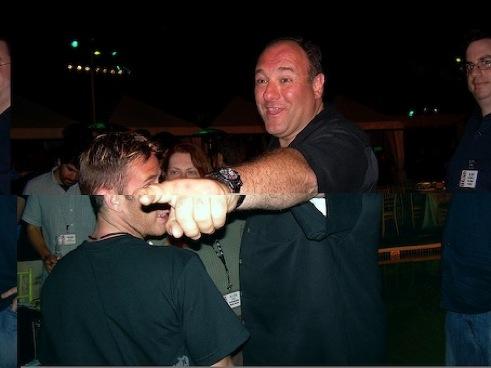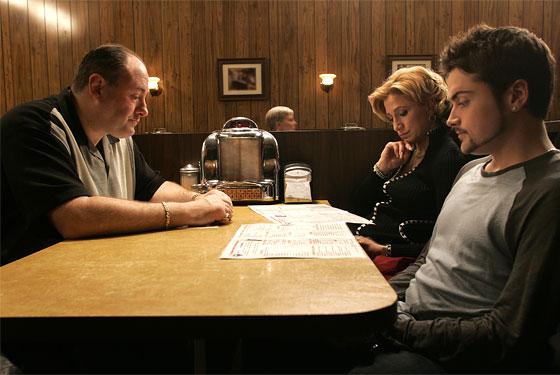Remembering James Gandolfini
Carroll O’Connor as Archie Bunker.
James Arness as Matt Dillon.
Larry Hagman as J.R. Ewing.
James Gandolfini as Tony Soprano.
These indelible TV roles will never say die. But the actors who played them are all too perishable. Adding “the late James Gandolfini” to this list is particularly painful.
The deaths of O’Connor (at age 76), Arness (88) and Hagman (81) all came at the “appropriate” time. Gandolfini was just 51 when the end came.

Up against a hotel foyer wall after the session had ended, Gandolfini dispensed short but affable answers to a cluster of TV writers.
“Would it disappoint you if Tony were killed?” he was asked.
“It would feel odd for a moment,” Gandolfini said. “But I think it would be as valid an ending as anything.”
One more thing: “How would you feel about a heart attack?”
“That would be kinda lame,” Gandolfini replied.

The role of Tony Soprano, a methodically vicious but palpably vulnerable New Jersey mob leader, catapulted Gandolfini from everyday, unknown character actor to international stardom. Outwardly at least, he didn’t care at all for the latter. Nor was he much for introspection about either the acting craft or the role of his lifetime. Let the finished product do the talking. And Gandolfini’s work was exquisite, whether sparring in therapy sessions with Lorraine Bracco’s Dr. Jennifer Melfi, brutalizing a subordinate or having it out with wife Carmela (Edie Falco), on whom he cheated with abandon.
The Sopranos first hit full force in January of 1999, when HBO introduced it to rave, open-mouthed reviews. In the summer of that year, Gandolfini endured his first big brush with the media at the annual Television Critics Association awards, where he shared an “Outstanding Individual Achievement in Drama” trophy with Ally McBeal and The Practice creator David E. Kelley. He also had just been nominated for a best actor Emmy, which he lost before eventually winning three in a row.
Gandolfini and the rest of The Sopranos cast had been flown in from New Jersey, where filming on Episode 2 of Season 2 was in progress. He clearly didn’t enjoy the idea of being peppered with questions during a pre-awards reception.
“This is very nice. But I just think the character’s a lot more interesting than me,” Gandolfini said. “I just say the words that (creator) David Chase gives me.”
Chase and Gandolfini were a matched pair in terms of shrinking from off-camera spotlights. But they were comrades in arms when it came to perfecting The Sopranos and then living up to the phenomenon it had become.
“I thought he (Chase) would give it to someone who’s a little more suave, a little more like these dons are usually,” Gandolfini said. “I’m not like that at all. I was very surprised when I got it. They decided to take a shot, I guess. Of course, I was probably kind of cheap.”
He had grown antsy by then, eager to escape. Asked what he liked most about Tony, Gandolfini found his exit line. “His Russian mistress,” he said to laughter. “That’s about it, right? Thank you very much.”
Post-awards, he beat a hasty and emphatic retreat. “Get me out of here. Get me out of here now,” he ordered an HBO publicist. And that was that.
“He’s a very shy man,” co-star Bracco said. “It’s very sweet. With me, he’s an animal, though.”
She let loose with a big laugh. But everyone felt the pressure after Season 1 racked up 16 Emmy nominations.
“Absolutely,” Bracco said. “Not for the Emmys so much, but whether you can continue to do good work, real work, truthful work.”
Falco said she couldn’t yet grasp any thoughts that The Sopranos would someday be seen in the same ground-breaking, classic league as Hill Street Blues or All In the Family.
“I can’t go there in my head,” she said. “Otherwise you can’t do the work. We’ve got to do what we did last year. It’s a buncha people who are good actors working until the wee hours of the morning laughing our heads off. If you have to stand above it and say this is a classic thing, well, that’s just too big a title to put on it.”
Gandolfini earlier had gamely tried his best to laugh off any aspirations to greatness.
“I’m sure we’ll screw it up,” he deadpanned. “But it’s not brain surgery. You just do the best you can.”
Gandolfini remained the indispensable front-and-center bada bing of The Sopranos throughout its storied six-season, 86-episode run. As with the far more debonair but equally self-destructive Don Draper on Mad Men, Tony triggered virtually any action of reaction of consequence. He was a raging bull, a shaky mama’s boy, a lover, a hater, a compulsive, consumptive creature with disparate appetites and needs.
Gandolfini never hit a false note during any of this. But what a yeoman effort it must have taken to keep rising to these challenges. “I’m a neurotic mess,” Gandolfini once said of himself. “I’m really basically like a 260-pound Woody Allen.”
That was before he began the care and feeding of the neurotic mess known as Tony Soprano. And it ate away at him in those early years.
“When I leave work now, I leave,” he said at that 2006 interview session. “I think it kind of spilled over a little bit in the beginning. I’ve made a lot of mistakes. I had a lot to learn about being famous. There’s a lot of good things about it and a lot of things I’d like to change. But mostly good things.”
One of them was being a co-presenter, with LeAnn Rimes, at the 2005 Country Music Association Awards in Manhattan.
“That’s a perfect example (of what fame can bring),” he said. “I met a lot of people I never would’ve met. But I made a bit of a fool of myself because I didn’t know who anybody was really.”
Post-Sopranos, Gandolfini had anticipated starring as Ernest Hemingway in a film about his marriage to photographer Martha Gellhorn, who would be played by Robin Wright Penn.
“But that’s a ways off,” he emphasized. “I’m not very good at the multi-tasking thing … I’m not the kind of guy who can take four phone calls at once or something. I just want to concentrate on doing (The Sopranos).”
Those roles eventually went to Clive Owen and Nicole Kidman in the 2012 HBO movie Hemingway & Gellhorn. But Gandolfini did return to HBO as the executive producer and interviewer in 2007’s Alive Day Memories: Home From Iraq. He appeared on behalf of the one-hour documentary just over a month after the final episode of The Sopranos. And no, he wasn’t talking about that, either during or after a session in which he sat amid five veterans missing a total of six limbs.
“Would you entertain one question about The Sopranos?” he was asked afterward during a typically hasty retreat.
“No,” he replied. “Put that to rest.”
“Is it a relief to be done with the character?”
“Yes. Thank you very much.”
He said this without rancor. It wasn’t a contempt for the media — or at least didn’t come off that way. Gandolfini again was simply uncomfortable talking about himself — whatever the circumstances. Asked how filming Alive Day Memories had affected him, he told TV critics, “It’s not about me. I’m not trying to be antagonistic in any way, but I’d like the questions directed towards other things besides how it changed me … Let’s have a different question.”
At a party that night thrown by HBO, Gandolfini arrived without any entourage. He mostly mingled with the veterans who appeared in the film. And at one point, he could be seen tipping a bartender with a small stack of $5 bills. It wasn’t for show. There’s no way Gandolfini knew that anyone was watching.
Before his death, Gandolfini filmed an episode of Criminal Justice, an intended 7-part drama bought by HBO and spun from the same-named BBC series. He played an unscrupulous New York City attorney whose career and life go topsy turvy after he agrees to represent a Pakistani accused of murdering a girl.
After The Sopranos, Gandolfini also had supporting roles in Zero Dark Thirty, Not Fade Away (written and directed by Chase) and the HBO movie Cinema Verite.
His all-too-short lifetime is clearly marked by that one singular role, though. Perhaps James Gandolfini wasn’t born to be The Sopranos’s indispensable sexy beast. But he found it and it found him. And toward the end of the show’s historic run, he seemed to accept if not embrace the fact that Tony Soprano would forever be his calling card.
“It’s a dark, dark world, and you’re in it a lot,” Gandolfini said. “However, if you’re going to be in a dark world, I can’t thing of any better one to be in.”
Read more by Ed Bark at unclebarky.com